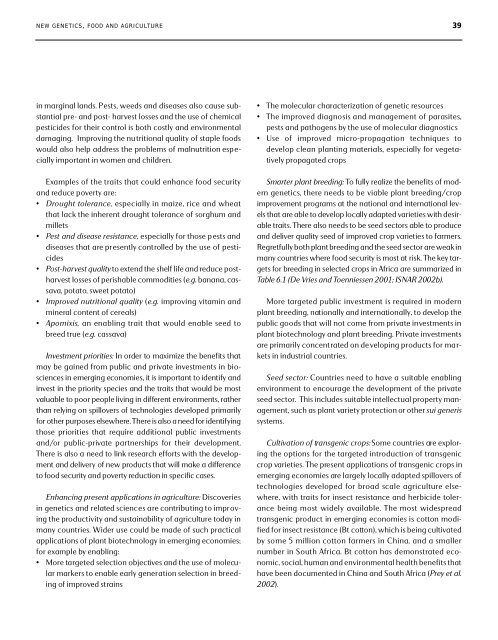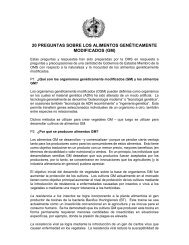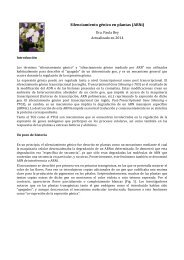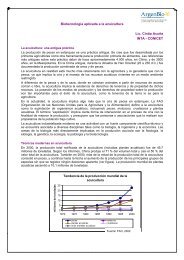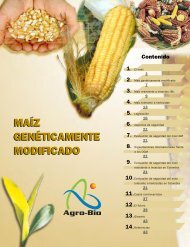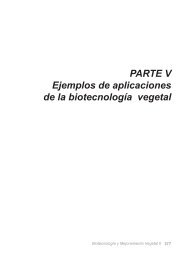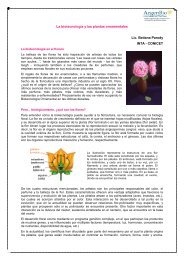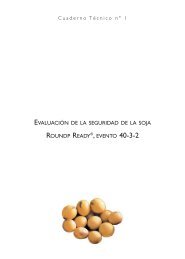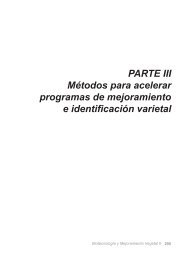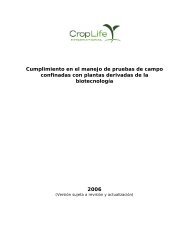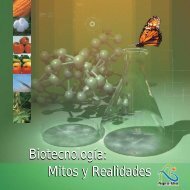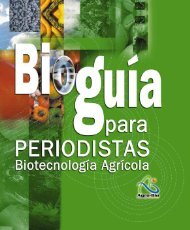New Genetics, Food and Agriculture: Scientific ... - ArgenBio
New Genetics, Food and Agriculture: Scientific ... - ArgenBio
New Genetics, Food and Agriculture: Scientific ... - ArgenBio
Create successful ePaper yourself
Turn your PDF publications into a flip-book with our unique Google optimized e-Paper software.
N E W G E N E T I C S, F O O D A N D A G R I C U LT U R E 39in marginal l<strong>and</strong>s. Pests, weeds <strong>and</strong> diseases also cause substantialpre- <strong>and</strong> post- harvest losses <strong>and</strong> the use of chemicalpesticides for their control is both costly <strong>and</strong> environmentaldamaging. Improving the nutritional quality of staple foodswould also help address the problems of malnutrition especiallyimportant in women <strong>and</strong> children.Exam pl es of the traits th at could enhan ce food secur i ty<strong>and</strong> reduce poverty are:• D rought tol e ran ce , es pecially in mai ze, rice <strong>and</strong> wh e atthat lack the inherent drought tolerance of sorghum <strong>and</strong>millets• Pest <strong>and</strong> disease resistance, especially for those pests <strong>and</strong>diseases that are presently controlled by the use of pesticides• Po s t - h arv est quality to extend the shelf life <strong>and</strong> re du ce po s t -h arvest losses of pe r i sh a ble co m m od i ti es (e .g . ban an a, cassava, po tato, sweet po tato)• I m p rov ed nutr i tional quality (e .g . i m p roving vitamin an dmineral content of cereals)• A po m i x i s, an enabling trait th at would enable seed tobreed true (e.g. cassava)I nv es tment prioriti es : In order to maximize the be n e fits th atm ay be gained from public <strong>and</strong> private inves tments in biosc i e n ces in emerging eco n o m i es, it is impo r tant to identi fy an di nvest in the priority spe c i es <strong>and</strong> the traits th at would be mostva l u a ble to poor pe o ple living in diffe rent env i ro n m e n t s, rath e rth an relying on spillove rs of te c h n ol og i es deve l o ped primar i l yfor other pur po s es elsewh e re. There is also a need for identi fy i n gthose prioriti es th at re q ui re additional public inves tm e n t san d /or publ i c - p r ivate par tn e rships for their deve l o p m e n t .T h e re is also a need to link res e arch efforts with the deve l o p-ment <strong>and</strong> delive ry of new products th at will make a diffe re n ceto food secur i ty <strong>and</strong> pove r ty re du c tion in spe c i fic cas es.Enhancing present applications in agriculture: Discoveriesin genetics <strong>and</strong> related sciences are contributing to improvingthe productivity <strong>and</strong> sustainability of agriculture today inmany countries. Wider use could be made of such practicalapplications of plant biotechnology in emerging economies;for example by enabling:• More targeted selection objectives <strong>and</strong> the use of molecularmarkers to enable early generation selection in breedingof improved strains• The molecular characterization of genetic resources• The improved diagnosis <strong>and</strong> management of paras i tes,pests <strong>and</strong> pathogens by the use of molecular diagnostics• Use of improved micro - p ro pa g ation te c h n i q u es tod evelop clean pl an ting mate r i a l s, es pecially for ve g e tativelypropagated cropsS m ar ter pl ant breeding: To fully re a l i ze the be n e fits of moderngeneti cs, th e re needs to be viable pl ant bre e d i n g /c ro pi m p rovement programs at the national <strong>and</strong> inte r n ational levelsth at are able to develop locally adapted var i e ti es with des i r-a ble traits. There also needs to be seed secto rs able to produ ce<strong>and</strong> deliver quality seed of improved crop var i e ti es to far m e rs .Re gre tfully bo th pl ant breeding <strong>and</strong> the seed sector are weak inm any co un tr i es wh e re food secur i ty is most at risk. The key targetsfor breeding in selected crops in Afr i ca are sum m ar i zed inTa ble 6.1 (De Vr i es <strong>and</strong> Toe n n i essen 2001; ISNAR 2002b).Mo re targ e ted public inves tment is re q ui red in mod e r nplant breeding, nationally <strong>and</strong> internationally, to develop thepublic goods that will not come from private investments inplant biotechnology <strong>and</strong> plant breeding. Private investmentsare primarily concentrated on developing products for marketsin industrial countries.Seed sec tor: Co un tr i es need to have a sui ta ble enabl i n ge nv i ronment to enco urage the development of the privateseed sector. This includes suitable intellectual property management,such as plant variety protection or other sui generissystems.Cultivation of transgenic crops: Some countries are exploringthe options for the targ e ted introdu c tion of tran s g e n i ccrop varieties. The present applications of transgenic crops inemerging economies are largely locally adapted spillovers ofte c h n ol og i es deve l o ped for broad scale agr i cu l ture elsewhe re, with traits for insect res i s tan ce <strong>and</strong> herbicide tol e r-an ce being most widely avai l a ble. The most wides p re a dtransgenic product in emerging eco n o m i es is co tton mod i-fied for insect resistance (Bt cotton), which is being cultivatedby some 5 million co tton far m e rs in Ch i n a, <strong>and</strong> a smallern um ber in So uth Afr i ca. Bt co tton has demonstrated economic,social, human <strong>and</strong> environmental health benefits thathave been documented in China <strong>and</strong> South Africa (Prey et al.2002).


